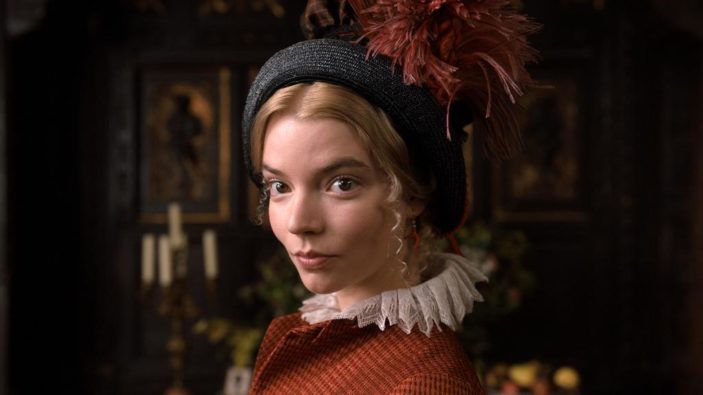
Similar to how Greta Gerwig‘s Little Women proved that we did indeed need another adaptation of Louisa May Alcott‘s classic novel, Autumn de Wilde‘s Emma. (yes the period in the title is deliberate) is further proof that a fresh coat of paint can reinvigorate even the most familiar of structures.
Arriving some 25-years after both Gwyneth Paltrow and Alicia Silverstone brought Jane Austen‘s sharp female cupid to life in their own respective breakout vehicles – Paltrow in the more traditional name-same period comedy, Silverstone in the perky Beverly Hills update that was Clueless – Anya Taylor-Joy, a rising star in her own right, headlines this impossibly lush and consistently witty reinvention that highlights Austen’s wit (New Zealand novelist Eleanor Catton serves as the screenwriter) with a welcome intelligence.
There’s the usual sweeping romance, tailored costume porn, and impeccably rich locations that we would expect, but at the film’s core is a comedic bite that practically stings – hell, Taylor-Joy’s Emma even comes down with a nosebleed when she’s overrun with feelings she very well believed she had succeeded at burying – and it’s with the film’s bold cheek to merge the hurt and the humour that it emerges very much as its own product, and not the simple remake many would assume it will be; and on the subject of cheek, de Wilde’s decision to push her PG rating to its limits speaks to its audacious spirit as early moments surrounding Emma and her destined beau (Johnny Flynn‘s Mr. Knightley) centre around their behinds – hers as she casually lifts her dress to warm it by the fire, his as he enters the frame fully nude as he gets dressed to visit Emma’s estate.
But before Emma and Mr. Knightley can proclaim their love for one another, the narrative swirls around Emma’s hopeful matchmaking schemes to unite her naive new friend (the luminous Mia Goth as Harriet) and the rather theatrical town vicar (Josh O’Connor‘s Mr. Elton). This plot strand speaks to Emma.‘s romantic comedy sensibilities, but in keeping with this film’ more biting temperament, the undercurrent of manipulation and anxiety similarly run rampant; Catton’s script always managing to ground its dramatics with an organic relatability.
As assured as both Catton’s words and de Wilde’s direction are, it’s Taylor-Joy who runs with the material in a manner that Emma the character has yet embodied. The actress – hardly known for playing warm characters – brings a far more arrogant and unruly nature to proceedings, but it’s because she’s so natural at playing with that superiority that when the script allows her cracks to show, we warm that much more to Emma’s vulnerability and flaws. And playing off the playful assuredness of the rockstar-like Flynn only further showcases Taylor-Joy’s inherent ability to produce a homeliness we have so rarely seen from her.
Aided by Bill Nighy‘s infectious eccentricity as Emma’s doting father, Goth’s docility, and Miranda Hart‘s somewhat desperate, yet no less loveable comedic flair as the genteel spinster Miss Bates, as well as the visual opulence of Alexandra Byrne‘s costuming (the Academy Award-winning designer of such fare as Elizabeth, Thor, and Murder on the Orient Express) and Isobel Waller-Bridge‘s (yep, Phoebe’s sister) traditional score, Emma., like the matchmaker at its core, is a film poised in its ability to meld the artistic taste of its novel origins with the supportive mindset of today’s audiences.
![]()
![]()
![]()
![]()
![]()
FOUR STARS (OUT OF FIVE)
Emma. is screening in Australian theatres now
